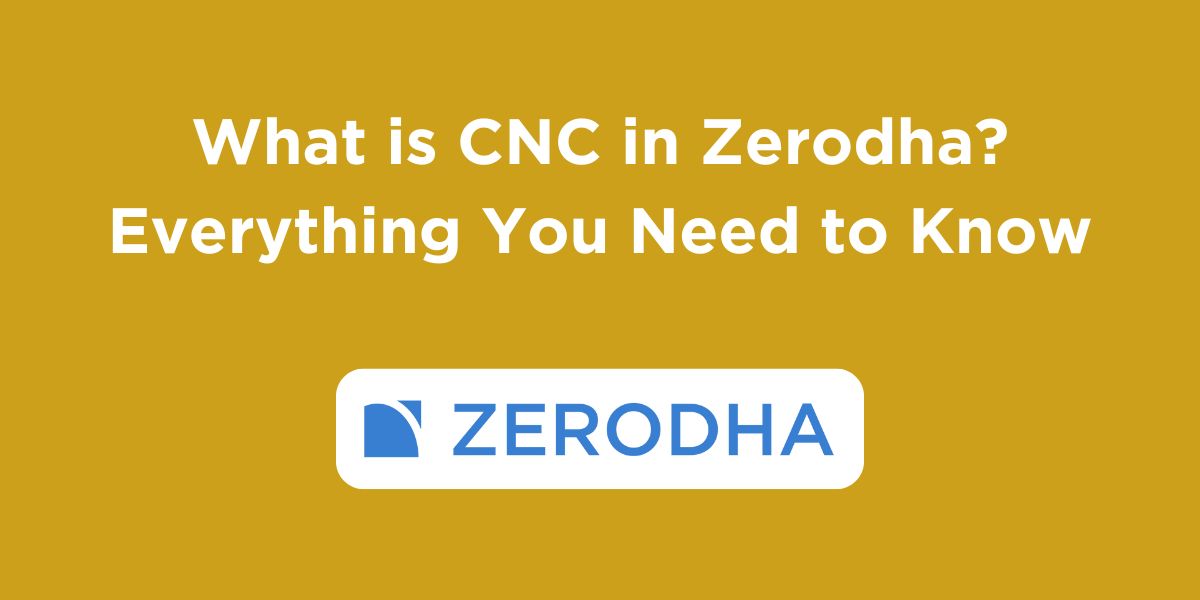When you start trading on Zerodha, you’ll come across two main order types: CNC and MIS. Understanding the difference between these two is crucial for successful trading. In this blog post, we’ll delve into what is CNC in Zerodha, how it works, and the key points you need to remember.
What Does CNC Mean in Zerodha?
CNC is the abbreviation for “Cash and Carry”. It’s a type of order placed on the exchange where you need to have the full funds in your account before the trade is executed. In simpler terms, you need to pay the entire amount for the shares you buy upfront.
What Does CNC Stand For?
CNC stands for “Cash and Carry”. It’s a type of order placed in the stock market where you’re required to pay the full upfront cost of the shares you’re buying. In essence, you’re taking physical delivery of the shares.
How Does CNC Work?
After discussing what is CNC in Zerodha, let us understand how CNC work for traders:
- Order Placement: When you place a CNC order, you’re essentially committing to buying or selling shares with your own funds.
- Funds Verification: Zerodha will verify if you have sufficient funds in your account to cover the cost of the shares.
- Order Execution: If the funds are available, the order will be executed on the exchange.
- Delivery: The shares purchased will be transferred to your Demat account.
Key Points to Remember About CNC
- Full Payment: You must have the full amount for the shares in your trading account before placing a CNC order.
- Delivery Obligation: You are obligated to take delivery of the shares if your buy order is executed.
- No Intraday Trading: CNC orders cannot be squared off intraday. You must hold the shares until you sell them.
- Margin Requirements: Margin is not applicable for CNC orders as you’re paying the full amount upfront.
Benefits of CNC Trading
After discussing what is CNC in Zerodha, let us understand what are its benefits for the traders:
- Reduced Risk: CNC trading eliminates the risk of margin calls and losses exceeding your invested amount.
- Ownership: You become the owner of the shares, which can provide a sense of security.
- Long-Term Investments: CNC is suitable for long-term investments as you can hold the shares for as long as you want.
Key Differences Between CNC and MIS
Another common order type on Zerodha is MIS (Margin Intraday). Here’s a brief comparison of CNC and MIS:
| Feature | CNC | MIS |
| Delivery | Required | Not Required |
| Margin | No Margin | Margin Provided |
| Profit/Loss Settlement | T+2 Days | Intraday |
| Holding Period | Long-Term | Intraday |
Read More: How to Change UPI Pin in PhonePe? A Quick Guide
Wrapping Up
That was all about what is CNC in Zerodha. CNC is a straightforward order type in Zerodha that involves buying or selling shares with your own funds. It’s a suitable option for investors who prefer long-term investments and want to avoid the risks associated with margin trading. By understanding the key points of CNC, you can make informed decisions and effectively manage your trades on Zerodha.
FAQs About CNC in Zerodha
Can I square off a CNC order intraday?
No, you cannot square off a CNC order intraday. You must hold the shares until you sell them.
What are the margin requirements for CNC orders?
There are no margin requirements for CNC orders as you’re paying the full amount upfront.
Can I use CNC for intraday trading?
No, CNC is not suitable for intraday trading. You must hold the shares until you sell them.
Is CNC safer than MIS?
CNC is generally considered safer than MIS as there’s no risk of margin calls or losses exceeding your invested amount.
When should I use CNC?
CNC is suitable for long-term investments where you want to own the shares and avoid the risks associated with intraday trading.

